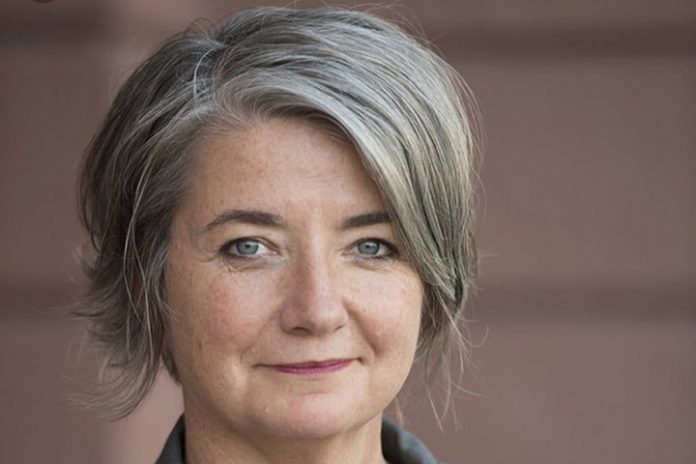Swedish Ambassador to the United States Karin Olofsdotter visited the College of William and Mary Oct. 3 to deliver the 2019 McSwain-Walker Lecture. Addressing an audience in St. George Tucker Hall filled with faculty, students and local Williamsburg residents, Olofsdotter discussed the complicated trilateral relationship between her home country, the U.S. and the European Union, and touched upon some of the social, economic and cultural ramifications of international politics in the 21st century.
Varying motivations led students to attend Olofsdotter’s talk.
“I’m here for my Intro to International Politics … I’m also here because I’m very interested in diplomacy and the ambassadorial process,” Grace Scott ’23 said.
Vice Provost for International Affairs Steve Hanson introduced Olofsdotter and elucidated the purpose of the annual lecture before detailing Olofsdotter’s distinguished career in public service. According to Hanson, the McSwain-Walker talk fosters dialogue on how the United States interacts with exogenous political and cultural forces.
“It is one that brings renowned scholars, artists, analysts and other notable public figures to William and Mary to speak on topics related to how other countries and cultures interact with the United States and how the United States interacts with them,” Hanson said.
Before Olofsdotter took to the podium, Hanson catalogued some of her professional accomplishments. Olofsdotter began her current ambassadorial posting in September 2017, and has since spent two years working in Washington, D.C. Her career with the Swedish Foreign Service began in 1994, when she first started working at the Swedish Embassy in Moscow.
Following several postings specializing in defense issues and security policy, Olofsdotter took on her first ambassadorial role as the Swedish Ambassador to Hungary in 2011, and in that capacity, she worked with various policy makers within the European Union and the North Atlantic Treaty Organization.
Olofsdotter began her speech by listing a series of light-hearted facts about her home country. She referenced Sweden’s extensive forest coverage and its significant moose population — over half-a-million moose live alongside 10 million Swedes — before discussing more serious national characteristics.
She touted the Swedish passport as the third strongest in the world for visa-less travel, and reminded the audience of prominent Swedish corporations, including Volvo, Spotify, H&M and IKEA, that have wide-reaching positive impacts on Americans. Olofsdotter reminded audience members that while they may not recognize it, Swedish people, companies and influences are ubiquitous in modern America. This sentiment is most visible to Olofsdotter when she interacts with U.S. senators and representatives, who frequently clamor for IKEAs to set up shop in their congressional districts.
“I walk the halls of Congress frequently, to talk to members of Congress, and I still haven’t met one member of Congress who wouldn’t like an IKEA in his constituency,” Olofsdotter said.
Once Olofsdotter established Sweden’s extensive legacy and presence within the United States, she transitioned to evaluating the two countries’ bilateral relationship. While diplomatic ties between Sweden and the United States date back to 1783, Olofsdotter commented on the relationship’s importance within modern geo-politics. However, despite the warmth of the Swedish-American relationship, Olofsdotter emphasized concerns regarding President Donald Trump’s trade policies because of their ramifications for Sweden’s economy.
“The United States is our fourth largest trading partner, so right now, of course, the discussions on trade in Washington are for us, actually existential,” Olofsdotter said. “… We are very worried about the protectionism we hear, the use of tariffs for various reasons, of course we also see the same issues with China as the United States does, but the tariff hurts our companies as well.”
She then described the deleterious consequences of Trump’s tariffs and voiced her frustration with the administration’s rationale behind imposing them.
“We are also following, and are quite upset, I’m going to be frank with you, when it comes to the steel and aluminum tariffs that have been put on Europe out of national security reasons … that is not acceptable,” Olofsdotter said. “Most countries in Europe have a deep and long-standing security relationship with the United States, most of them are members of NATO, so to say that steel and aluminum are threats to U.S. national security — it’s just protectionism.”
After pointing out the tariffs’ consequences for both Swedish companies and American consumers, Olofsdotter provided a brief overview of other endemic threats to Swedish national security in the 21st century. Among these concerns is Russian aggression, which Sweden has sought to combat following Russia’s 2014 occupation of Crimea and its subsequent meddling throughout Northern Europe and the Baltic states. These anxieties have prompted Sweden to reevaluate its security priorities, especially given the inaccurate expectations of what a post-Soviet world would look like.
“When the Soviet Union collapsed, we all thought that the world would be peace and love, basically … so we deconstructed and cut down on our defense, and we made it rather quickly, so we have realized over the past years that the world is not as much peace and love as we thought it would be in the 90s,” Olofsdotter said. “This means we are going back to a conscript army, we are buying new submarines … we are increasing our exercises together with our neighboring countries and with the United States, to show Russia that we are serious in the defense of our country.”
In closing her speech, Olofsdotter commented on the importance of tolerance in an increasingly chaotic world by providing a personal anecdote about her grandmother, who in expressing contempt for Danes and Finns illustrated the vitality of approaching situations with understanding rather than hatred.
“I just want to remind you that every generation has its ‘scary foreigner’ … my grandmother was born in 1900, she thought that Danish people and Finnish people were the absolute worst, they were not to be trusted, they were not clean, they were drunk,” Olofsdotter said. “Of course, the ‘scary foreigner’ just comes from further away these days, but it’s exactly the same emotions.”

